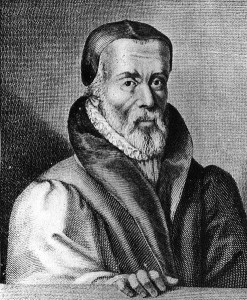 The 2nd October 1528 saw the publication of English reformer and Bible translator William Tyndale’s “The Obedience of the Christian Man” (full title: “The Obedience of a Christen man, and how Christen rulers ought to govern, wherein also (if thou mark diligently) thou shalt find eyes to perceive the crafty convience of all jugglers”) in Antwerp. What has this book got to do with Anne Boleyn and Henry VIII? Well, it is thought to be the text that helped Henry VIII to realise that Kings were accountable only to God, and not to the Pope.
The 2nd October 1528 saw the publication of English reformer and Bible translator William Tyndale’s “The Obedience of the Christian Man” (full title: “The Obedience of a Christen man, and how Christen rulers ought to govern, wherein also (if thou mark diligently) thou shalt find eyes to perceive the crafty convience of all jugglers”) in Antwerp. What has this book got to do with Anne Boleyn and Henry VIII? Well, it is thought to be the text that helped Henry VIII to realise that Kings were accountable only to God, and not to the Pope.
George Wyatt, grandson of Thomas Wyatt the Poet, and 17th century clergyman and historian John Strype tell the same story to explain how this heretical book found its way into the hands of King Henry VIII. According to them, in around 1529 Anne Boleyn lent Anne Gainsford, one of her ladies, Tyndale’s “Obedience” to read. Anne Gainsford’s suitor, George Zouch, “plucked” it from his sweetheart and then it got taken off him by Dr Sampson, Dean of the Chapel Royal, who saw Zouch reading it in the chapel.
Sampson, along with other clergyman, had been commanded by Cardinal Wolsey to keep an eye out for heretical books, so he took the book straight to Wolsey. In the meantime, Anne Boleyn had asked her lady if she could have the book back. Her lady was distraught that she could not give the book back to her mistress, but Anne was not angry or upset, she simply commented, “Well, it shall be the dearest Book that ever the Dean or Cardinal took away.” Anne then went to the King to ask him to intervene with Wolsey to get the book returned. When the book was returned to her, Anne took it to the King and “besought his Grace most tenderly to read it.” Wyatt writes of how she had marked matters “worthy of the King’s knowledge” with her fingernail and Strype describes how the King was “delighted” with the book and remarked that “This Book is for me and all Kings to read.”
Strype goes on to say:
“And in a little Time the King by the Help of this virtuous Lady, by the Means aforefaid, had his Eyes opened to the Truth, to search the Truth , to advance God’s Religion and Glory, to abhor the Pope’s Doctrine, his Lies, his Pomp and Pride, to deliver his Subjects out of the Egyptian Darkness, the Babylonian Bonds, that the Pope had brought him and his Subjects under. And so contemning the Threats of all the World, the Power of Princes, Rebellions of his Subjects at Home, and the raging of so many and mighty Potentates abroad; set forward a Reformation in Religion, beginning with the Triple Crowned Head at first, and so came down to the Members, Bishops, Abbots, Priors, and such like.”
Although Tyndale ended up being executed as a heretic during Henry VIII’s reign, his book was instrumental in helping Henry VIII see how he could have his marriage to Catherine of Aragon annulled, while also limiting the power of the papacy in England. The steps Henry VIII took as a result of reading “Obedience” sparked off the English Reformation. However, Tyndale’s message regarding how “God has appointed the kings, princes, and other secular leaders as his representatives on earth” – and kings, therefore, being the highest authority in the land – and his challenge of the Pope’s ” temporal authority over king and emperor” was just one small part of the book. Other subjects include:
- The supremacy of God’s word over everything else
- The importance of God’s word being made available to the laity in English
- The importance of teaching scripture rather than focusing on ecclesiastical law
- Instructions for how to live and what “obedience” means in daily life
- The abuses of the Church
If you want to read what Anne Boleyn and Henry VIII read, then you can read Tyndale’s book online – click here. Anne Boleyn also owned a copy of William Tyndale’s translation of the New Testament, which can still be purchased at bookstores today. You can read more about Tyndale in my article The Most Dangerous Man in Tudor England: A Review and Rundown.
Notes and Sources
- Wyatt, George. The Life of Anne Boleigne. This appears in The Life of Cardinal Wolsey: Volume II by George Cavendish.
- Strype, John (1721). Ecclesiastical memorials relating chiefly to religion and the reformation of it, and the emergencies of the Church of England, under King Henry VIII, King Edward VI and Queen Mary the First, Volume I, p112-113. This can be read at http://archive.org/stream/ecclesiastical01stry#page/n141/mode/2up
- Tyndale, William (1528) The Obedience of a Christian Man
- The Most Dangerous Man in Tudor England, BBC documentary presented by Melvyn Bragg and aired in June 2013